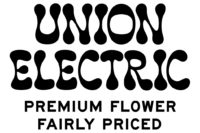In this “Flower-Side Chats” series of articles, Green interviews integrated cannabis companies and flower brands that are bringing unique business models to the industry. Particular attention is focused on how these businesses integrate innovative practices in order to navigate a rapidly changing landscape of regulations, supply chain and consumer demand.
The California legal flower market is the largest in North America. According to recent BDSA data, monthly cannabis sales in January 2021 were $243.5 million. Flower sales represented 35.6% of overall sales, or about $87 million, representing a $1 billion yearly run rate for 2021 flower sales in California.
Union Electric was founded in California in 2020 as one of OpenNest Labs’ first incubator brands. Its model is uniquely asset-light, and focused on filling an area of opportunity with a consumer-first approach, aimed at an underserved market: the working-class customer. The name Union Electric was inspired by the punching-in and punching-out aspect of working a union job — more specifically, the average cannabis user’s job. The name also represents the brand’s union of stakeholders: Customers, cultivators and retailers alike, working together to provide affordable, quality products.
Max Goldstein is the CEO of Union Electric and Founding Partner at OpenNest Labs. Max incubated Union Electric at OpenNest Labs, a cannabis venture studio he helped co-found, and launched the brand in 2020 the day after COVID lockdowns began in California. Prior to Union Electric, Max worked at Google managing a 90 person, 12-market partnerships team.
Aaron Green: How did you get into the cannabis industry?
Max Goldstein: I’ve had a fun entrepreneurial and professional journey. I started my career in my 20s with Google working in the marketing department sitting at the intersection of new product development and customers. During that time, I really learned the ins and outs of bringing products to market and building brands. I had to understand how to value and champion the customer, or the user. At Google, I was sitting at the intersection of people building products that are affecting billions of people’s lives and users and customers that potentially have really cool insights and feedback. It was an incredible learning experience. I was able to focus on what I’m good at, which is that early stage of businesses and most importantly, listening to the consumer and developing products and services that they ultimately really want.

Near the end of 2018, I co-founded OpenNest Labs, a cannabis venture studio. We came together as a four-person partnership to form OpenNest, as an assortment of skill sets, with all of us contributing an area of focus that we could really combine our experiences to take focused and concerted efforts at building brands that resonate with different consumers across various form factors in cannabis and health. My partner Tyler Wakstein has been in the cannabis industry for several years and helped launch the brand, hmbldt (which is now Dosist) and a number of other projects in the cannabis space.
Green: Was Union Electric an incubation project out of OpenNest?
Goldstein: Yes. Union Electric is the first project we incubated out of OpenNest. We launched the day after the pandemic. So, it was interesting timing.
At Union Electric we’re focused on the core, everyday consumer of cannabis. I think a lot of folks, particularly the new money that have come into the industry, have often focused on new form factors or things that they think the new cannabis consumer is going to enjoy or appreciate. Because quite frankly, that’s their level of familiarity with the industry. For us at Union Electric, we want to hit the end of the market with exactly what they want and that is high-potency, affordable flower with a brand that really stands for something and has values.
Union Electric is positioned as an advocate for the legal cannabis industry as a whole. We look at the stakeholders and the work that needs to be done across the board. The idea of just being one member of the value chain and not trying to ultimately uplift and elevate everyone in that value chain, it’s just not going to work in cannabis. We’ve seen a lot of people trying to go at this alone and I think the pandemic, if anything, showed that you’re only as good as your partners. We truly believe that the investment in our partners, in the local communities and everyone that’s really touching this industry is critical to ultimately building success for one company because a rising tide raises all ships.
Green: How did you settle on the name Union Electric?
Goldstein: One of the things that we wanted to do was focus the brand on who we see as the core consumer, which is somebody that is working hard, like a shift worker punching in and punching out and putting in the long hours on a daily basis and using cannabis as a critical part of their personal wellness and relief. There are elements of that which we certainly want to tap into. The “Union” represents our stakeholder approach, which is, all of us are in this together and our tagline “roll together” represents that. The “Electric” part is what we’ve seen cannabis sort of representing culturally, and for people more broadly. This is an exciting product that’s going to change a lot of people’s lives and, and I just don’t think there’s anything else in our lifetimes that we’re necessarily going to be able to work on from a consumer-packaged goods perspective, that’s going to change as many people’s lives. It’s electric. That’s how we came up with the name.
 The coloring and a lot of the brand elements that we focused on were about providing transparency and simplicity to the marketplace: big font and bold colors. There are little nuances with our packaging, like providing a window just so people can see the flower on our bags. We look at the details and made sure that we’re ultimately out of the way of the consumer and what they want, but providing that vehicle that they’re really comfortable with.
The coloring and a lot of the brand elements that we focused on were about providing transparency and simplicity to the marketplace: big font and bold colors. There are little nuances with our packaging, like providing a window just so people can see the flower on our bags. We look at the details and made sure that we’re ultimately out of the way of the consumer and what they want, but providing that vehicle that they’re really comfortable with.
Green: You have an asset-light business model, focusing on brand and partnerships. How did you come to that model?
Goldstein: I think everyone who’s operating and working in cannabis right now is looking at strategy and what the model is that’s going to work for them. We’re ultimately going to find out what works, which is why this industry is so fun and exciting. Our specific approach is really under the assumption that vertical integration in a market that’s maturing as quickly as California is going to be hard, if not impossible – it’s just too competitive. There are too many things going on in order to be successful in California. You have to be really good at cultivation, really good at manufacturing, really good at distribution, and then ultimately, you have to be able to tell a story of that process to ensure sell-through and that you really resonate with the consumer.
I think the big, missed opportunities that we’re seeing are that a lot of great cultivators are not marketers or storytellers. They really do need people that are there to help amplify and provide transparency to their stories. There are amazing stories out there of sacrifice and what cultivators have done to create a new strain. We all enjoy Gelato. What’s the process to make that happen or to create any other new strain? It’s fascinating. It’s too hard for a lot of these cultivators to go out and tell that story themselves. So, we act as a sales and marketing layer on top of the supply chain to provide visibility, transparency and trust with the consumer so that they know who grew their product, how it was grown, when it was cultivated and that they can build a real strong relationship with that cultivator as well.
It’s also hard to be a brand that’s using 19 different suppliers, selling the same genetics and expecting the same results. As an example, we’ve gotten Fatso from one of our partners, Natura. We’ve also gotten Fatso from Kind Op Corp (fka POSIBL). We renamed one of the strains – by adding a number on the end – just so that the consumer knew that we’re not saying that this is the same product, because it’s not. It’s from a different farmer and there’s going to be differences. While it does create a little bit more complexity for the consumer, we ultimately believe that every consumer has a right and will expect to know that type of information in the future.
Green: You launched Union Electric one day after the COVID lockdowns began in California. How did you navigate that landscape?

Goldstein: A lot of praying to the cannabis gods! It was really an incredibly challenging and difficult time. We were all concerned about the impacts of the virus. There were moments where we didn’t even know if dispensaries would be open, particularly in states that just legalized. You went from something being completely illegal to an essential business in 12 months. As a team, we were just trying to hold on to our hats and focus on product and partnerships.
Fortunately, with a brand like ours and the price point that we’re operating at, we just needed to consistently be on the shelves and available, and to be present with the bud tenders. So, we focused on that and shoring up our supply chain and just trying to wait it out. COVID forced a lot of cannabis companies to make a lot of decisions quickly and I think in some ways, because we have not been in the market for 24 months under one paradigm, we were pretty quick to be able to adjust and keep the team super lean to fit the emerging and rapidly changing environment. We learned a lot. We focused on partnerships and we leaned into the model that we set out to build which is being asset-light and focusing on the sell-through.
Green: I understand you have a 2% giveback program. Tell me about that.
Goldstein: The 2% giveback program was something that we wanted to put on the bag from day one. It’s on every bag that we made and put out into the market. We’ve seen a lot of cannabis companies come in and invest tens and hundreds of millions of dollars in infrastructure. Then, month 24 they realize “oh, crap, I gotta figure out what I’m going to do to get back and actually tap into the issues that are most important to cannabis consumers.” These are issues like social equity, equitable development of the industry, and ensuring that cannabis companies and its owners are active, responsible members of society.
What we’re going to focus on with our giveback program is working with our supply chain partners. We highlight the local communities, because when you look at the landscape in California, two thirds of its municipalities still don’t allow cannabis operations. We’re in a heart and minds battle still, even here in California, just proving that the operators here are not criminals and that they’re not going to bring negativity to local communities.
As we scale in California and scale to other states, the giveback program for us is a platform and a medium to work with our supply chain partners to make sure that we’re giving back and investing every step of the way. As founders and operators, it’s how we show that we are being mindful of the importance of equitable development of the industry. Ultimately, prosperity is going to come if everyone is getting a piece of the pie.
Green: What are you most interested in learning about?
Goldstein: I’m a student of history (I was a history major) and I was very fortunate to be part of a big evolution of technology development starting in 2011 working at Google and other tech companies. In some ways, this is the second generational industry that I’ve been a part of, and I have a lot of regrets about how the first one developed – not that I necessarily was the chief decision maker. The idea that large tech companies would always act responsibly (i.e. “Don’t be evil”) didn’t really pan out. I think it was an ignorant thought process as a person in my young 20s.
What I’m most interested in learning is: Can the cannabis industry develop consciously? Can you keep the greed and the things that bring industries down at bay? How can I, as an operator, be the best facilitator of that future? I’m always thinking how I can continue to bring in the people around us and around me as the CEO of Union Electric to ensure that we’re always focused on that.
Green: Great, that concludes the interview. Thank you, Max.
Goldstein: Thanks Aaron.
From Union Electric: Union Electric Cannabis will be offering their first Regulation CF crowdfund raise in an effort to give everyday consumers a stake in one of California’s fast growing cannabis brands. Due to the ever-evolving legal status of cannabis in the US, there have been very few opportunities for individuals to invest early on in American cannabis brands. This decision to give everyday cannabis smokers access to investing in their favorite cannabis brand (for as little as $100) is a natural manifestation of Union Electric’s mission: Collective power and championing accessibility for the plant. You can learn more about their raise by visiting https://republic.co/union-electric

